drones

Yesterday on MSNBC’s Up w/ Chris Hayes, former White House Press Secretary Robert Gibbs said in an interview that when he took that position, he was told not to discuss the government’s secret drone program or even acknowledge its existence. According to Gibbs:
“When I went through the process of becoming press secretary, one of the first things they told me was, ‘You’re not even to acknowledge the drone program. You’re not even to discuss that it exists.'”
He added:
“Here’s what’s inherently crazy about that proposition: you’re being asked a question based on reporting of a program that exists. So you’re the official government spokesperson acting as if the entire program … pay no attention to the man behind the curtain.”
At this point, after a leaked Justice Department memo, the John Brennan hearings, several ongoing U.N. negotiations, and coverage by most major news organizations, any denial of a drone program is laughable. It does exist, it is not a secret, and it is regularly killing people in several countries.

With a short note to the Congressional leadership, President Barack Obama announced last week that a total of 100 U.S. troops are now in Niger to “provide support for intelligence collection and will also facilitate intelligence sharing with French forces conducting operations in Mali.”
“A U.S. defense official, speaking on the condition of anonymity to provide details about military operations, said that the 40 troops who arrived in Niger on Wednesday were almost all Air Force personnel and that their mission was to support drone flights.
“The official said drone flights were “imminent” but declined to say whether unarmed, unmanned Predator aircraft had arrived in Niger or how many would be deployed there.”
The Predator drones will be unarmed and carry out surveillance missions. But The Post noted that theadministration had not ruled out arming the Predators with missiles in the future.
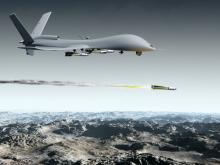
The drone operators sit at consoles on military bases around the U.S. They track their targets and when the moment is right, they send the command to fire. And then people die.
Drones have been in the news a lot over the past month as Congress has considered the nomination of John Brennan to head the Central Intelligence Agency (CIA). Brennan has been the chief architect of the drone policies of the Obama administration.
The constitutional questions have gotten quite a public airing, but drones raise deeper moral questions about what constraints there are on weapons of war.
Yes, drones are efficient, effective, and economical. But what do they do to the soul of this nation, to the psyches of those who push the buttons from half a world away? If they are moral for the U.S. to use at will in any nation of the world, are they moral for other nations to use against us?

The U.N. mission in Afghanistan released its annual report on civilian casualties in Afghanistan on Tuesday, finding a decrease from 2011. According to the Guardian, the U.N. also reported that 506 weapons were fired by drones in 2012, compared with 294 in 2011. Five cases resulted in civilian casualties, with 16 deaths and three wounded. Although drone attacks have become controversial in Pakistan, the Guardian writes:
“They have not been a prominent issue in Afghanistan, however. While drone attacks have occurred, they have largely been in support of ground troops during operations and have not been singled out by President Hamid Karzai's administration in its campaign against international air strikes.
“The steep rise in the number of weapons fired from unmanned aerial aircraft – the formal term for drones – raises the possibility that may change as US forces become more dependent on such attacks to fight al-Qaida and other insurgents as combat missions are due to end by the end of 2014.”
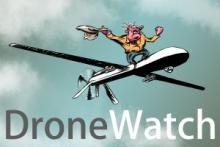
Dennis Sadowski at Catholic News Service has a good summary of the moral and ethical concerns about drone warfare from a workshop at the annual Catholic Social Ministry Gathering. One participant, Charles Camosy, assistant professor of Christian ethics at Fordham University, suggested that it should be viewed as a pro-life issue:
"It involves violence and violent killing. It involves the killing of the innocent in a way that doesn't follow the church's teaching. It's an exercise of raw violent power in a way that I think should get pro-lifers really, really upset," Camosy explained to CNS.
“Marie Dennis, co-president of Pax Christi International, suggested that drones have led to 'a battlefield without borders.' "We have a global battlefield, which completely undercuts any possibility of talking about just war. There are no boundaries on this thing," she said.”
As the drone debate continues, it should go deeper into these concerns rather than only discussing legalities.
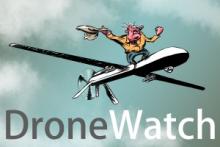
While we have been focusing on drones as weapons of war – killing by drone – controversy over the domestic use of drones is also growing. Police forces across the U.S. have become enamored by surveillance drones that can be used in law enforcement. But that has led to a rise in local governments beginning to strictly regulate their use or banning them. The New York Times reports on these efforts:
“To me, it’s Big Brother in the sky,” said Dave Norris, a city councilman in Charlottesville, Va., which this month became the first city in the country to restrict the use of drones. “I don’t mean to sound conspiratorial about it, but these drones are coming, and we need to put some safeguards in place so they are not abused.” … Last week, the Seattle Police Department agreed to return its two still-unused drones to the manufacturer after Mayor Michael McGinn answered public protests by banning their use.”
Some states have adopted moratoriums on drones pending further study, others are considering proposals that would require search warrants for their use. It is heartening that the objections are coming before drones are flying over all of us, rather than attempting to stop them when it is already too late.

The U.S. killing by drones in countries other than war zones is run by the CIA. This leads to the secrecy of the program, one of its controversial aspects. Now, according to Ken Dilanian in the Los Angeles Times, it may change.
“Facing growing pressure to lift the veil of secrecy around targeted killings overseas, the Obama administration is considering shifting more of the CIA's covert drone program to the Pentagon, which operates under legal guidelines that could allow for more public disclosure in some cases. John Brennan, whom President Obama has nominated to run the CIA, favors moving the bulk of drone killing operations to the military, current and former U.S. officials say.”
Some think this would result in less secrecy, as the Pentagon has already acknowledged its use of drones. Others think it would prove more difficult in causing problems for nations that secretly host U.S. drone bases. Whatever the perceived problems may be, if a change leads to a more open and accountable program, it’s a good thing.

Military medals have historically been given for exceptional bravery in combat. But the Defense Department has announced a new medal – for flying a drone. A servicemember can now sit at a screen in the United States with a joystick and earn a “Distinguished Warfare Medal.” Army Times reports,
“The Pentagon is creating a new high-level military medal that will recognize drone pilots and, in a controversial twist, giving it added clout by placing it above some traditional combat valor medals in the military’s 'order of precedence.'
“The Distinguished Warfare Medal will be awarded to pilots of unmanned aircraft, offensive cyber war experts or others who are directly involved in combat operations but who are not physically in theater and facing the physical risks that warfare historically entails.”

As the drone debate continues, the Senate Intelligence Committee is delaying a confirmation vote on John Brennan as CIA Director. Brennan most recently was President Obama’s counter-terrorism advisor, and in that capacity the administration’s point person on drones. The Washington Post reports:
“A Senate confirmation vote on John O. Brennan as CIA director has been postponed for at least two weeks as lawmakers step up pressure on the Obama administration to provide more information about its drone campaign against terrorism suspects.
“In particular, Senate Intelligence Committee Chairman Dianne Feinstein (D-Calif.) said Wednesday that she is seeking seven Justice Department memos related to the administration’s targeted killing program, in addition to four the committee has been allowed to view.”

The day after the hearing on John Brennan’s nomination to head the CIA, U.S. drones were back in action over Pakistan. An attack on Friday in the border tribal region killed seven suspected militants. NBC News reports:
“Seven people were killed and six others injured in a U.S. drone attack in Pakistan's South Waziristan tribal region on Friday evening, Pakistani security officials said. The officials and tribal sources said the drone fired six missiles and pounded two separate mud-built houses in the Babar area of the Ladha subdivision in the South Waziristan tribal region.”
Other reports with different details nclude DAWN, Al Jazeera, and the Associated Press.

America’s killing by drone program finally became frontpage news this week with the leak of a memo arguing the legality of targeting U.S. citizens suspected of being al Qaeda leaders. But the debate remains too small. Whether the president has the legal authority to order the killing of U.S. citizens is certainly an important question, but there are more fundamental issues not being given as much scrutiny. Some were touched on in the confirmation hearing of John Brennan, but much remains unanswered.
Beginning under President George W. Bush, and escalating under President Barack Obama, the United States is currently using armed drones in four countries (Afghanistan, Pakistan, Yemen, and Somalia), has used them in two others (Iraq and Libya), and is considering using them in northern Africa. Why should we oppose this means of warfare?
Perhaps the most important reason is this. For those of us who follow Jesus, the Prince of Peace, killing other people, whoever they are, by whatever means, violates his teachings. An endless cycle of violence is not the solution to our world’s problems; we should rather actively seek peace. We cannot expect nations to live by the ethic of Jesus, as John Howard Yoder reminded us. We can, however, expect them to live by law, the standards they have set to restrain the worst of violence. From that perspective, here are some reasons for opposing drone attacks.
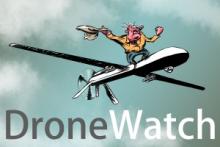
The publication on Monday of a previously secret Justice Department memo attempting to legally justify the killing of American citizens has opened the door for front-page questions about the entire drone program.

Editor's Note: DRONE WATCH follows daily developments about drone strikes and policy concerning the highly controversial usage of drones. To keep up to date, follow our Quick Read blog HERE.
One of the most hotly contested points of the administration’s drone policy is its claim to have legal justification for killing U.S. citizens. Now we have their rationale for that claim. Michael Isikoff, National Investigative Correspondent for NBC News, published on Monday a memo he says was given to members of the Senate Intelligence and Judiciary committees in June.
The “Department of Justice White Paper” outlines certain conditions for an attack. An “informed, high-level official of the U.S. government” must determine that the targeted U.S. citizen is a “senior, operational leader of al-Qa’ida or an associated force,” poses “an imminent threat of violent attack against the United States,” “capture is infeasible,” and the attack is conducted in a way consistent with “law of war principles.” In those conditions, the memo says, “a targeted killing of a U.S. citizen who has joined al-Qa’ida or its associated forces would be lawful under U.S. and international law.”
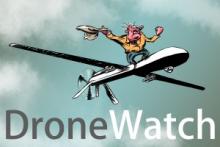
The New York Times reports that the U.S. is preparing to establish a base in northwest Africa so that it can fly drone surveillance missions against the local affiliate of Al Qaeda and other Islamist extremist groups.
“For now, officials say they envision flying only unarmed surveillance drones from the base, though they have not ruled out conducting missile strikes at some point if the threat worsens. …
“A handful of unarmed Predator drones would carry out surveillance missions in the region and fill a desperate need for more detailed information on a range of regional threats, including militants in Mali and the unabated flow of fighters and weapons from Libya. American military commanders and intelligence analysts complain that such information has been sorely lacking.”
This morning, Reuters reports that Niger has given permission for the drones to be based in that country. According to a “senior government source,” the U.S. Ambassador to Niger made to the request to the country’s president, who accepted it.
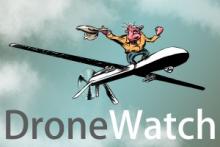
Ben Emmerson, a U.N. special rapporteur, is beginning an investigation into drone strikes in Afghanistan, Pakistan, Yemen, and Somalia, according to the Guardian.
“About 20 or 30 strikes – selected as representative of different types of attacks – will be studied to assess the extent of any civilian casualties, the identity of militants targeted and the legality of strikes in countries where the UN has not formally recognised there is a conflict.
“The inquiry will report to the UN general assembly in New York this autumn. Depending on its findings, it may recommend further action. Emmerson has previously suggested some drone attacks – particularly those known as "double tap" strikes where rescuers going to the aid of a first blast have become victims of a follow-up strike – could possibly constitute a 'war crime.'"
Several nations, including Pakistan, have requested the investigation.

Several months ago, the Washington Post reported that presidential counterterrorism adviser John Brennan was developing a “playbook” of rules for drone attacks:
“The “playbook,” as Brennan calls it, will lay out the administration’s evolving procedures for the targeted killings that have come to define its fight against al-Qaeda and its affiliates. It will cover the selection and approval of targets from the “disposition matrix,” the designation of who should pull the trigger when a killing is warranted, and the legal authorities the administration thinks sanction its actions in Pakistan, Yemen, Somalia and beyond.”
On Sunday, the Post followed with a report that the playbook was nearing completion, and would provide clear rules.
“In Yemen, officials said, strikes have been permitted only in cases in which intelligence indicates a specific threat to Americans. That could include “individuals who are personally involved in trying to kill Americans,” a senior administration official said, or “intelligence that . . . [for example] a truck has been configured in order to go after our embassy in Sanaa.
“The playbook has adopted that tighter standard and imposes other more stringent rules. Among them are requirements for White House approval of drone strikes and the involvement of multiple agencies — including the State Department — in nominating new names for kill lists.”
But there is one exception to the new rules. The CIA drone program in Pakistan gets an exemption for at least a year. That exemption is described as “a compromise that allowed officials to move forward with other parts of the playbook.” The disputed point that apparently led to it was the CIA’s use of so-called “signature strikes,” attacks based on behavior seen as suspicious rather than in specific identified targets.
It also appears that the coming withdrawal of U.S. troops from Afghanistan will lead to more and more drone attacks. The Post quotes a former official involved in the playbook, “There’s a sense that you put the pedal to the metal now…”
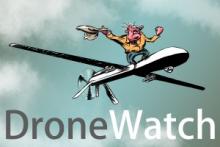
While Washington, D.C., reveled in the ceremonies and parties surrounding Inauguration Day, U.S. drones were busy in Yemen. According to Reuters, four attacks in four days, from Saturday to Tuesday, killed at least 14 people. The attacks led to a protest blockade by angry tribesmen:
“On Sunday armed tribesman, angry at what they said was a drone attack on an area inhabited by civilians, blocked the main road linking Maarib with Sanaa. Earlier this month, dozens of armed tribesmen also took to the streets in southern Yemen to protest against drone strikes that they said had killed innocent civilians and fuelled anger against the United States.”
In another protest, Reuters reported a rare criticism of drone strikes by a member of the Yemeni cabinet. Human rights minister Hooria Mashhou, who was formerly a top activist in the movement that ousted President Ali Abdullah Saleh a year ago, said during a U.N. Yemen humanitarian appeal meeting in Dubai:
"I am in favour of changing the anti-terrorism strategy. I think there are more effective strategies. We're committed to fighting terrorism but we're calling for changing the means and strategies. These means and strategies can be applied on the ground without harming civilians and without leading to human rights violations."
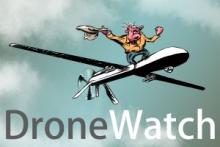
John Brennan, President Obama’s counterterrorism advisor and nominee for CIA Director, is one of the architects of the administration’s drone policy. The New York Times and the ACLU recently lost a case in court that attempted to make public the secret legal memos that are claimed to justify the policy. The confirmation hearings coming up will offer another chance.
Salon reports that Sen. Ron Wyden, D-Ore., wrote a letter to Brennan in light of his nomination asking to see the legal opinions that justify killing American citizens. He wrote:
“Senior intelligence officials have said publicly that they have to authority to knowingly use lethal force against Americans in the course of counterterrorism operations, and have indicated that there are secret legal opinions issued by the Justice Department’s Office of Legal Counsel and explain the basis of this authority. I have asked repeatedly to see these opinions, and I have been provided some relevant information on the topic, but I have yet to see the opinions themselves.”
From a broader viewpoint, Mary Ellen O'Connell, law professor at the University of Notre Dame and a specialist on the international law of armed conflict, expresses surprise that anyone would need to see the memos. Comparing it to the legal memos that claimed to justify waterboarding and secret detention by the Bush administration, she writes:
“It is surprising to me that anyone feels the need to actually see these secret memos. International law clearly makes waterboarding, secret detention and targeted killing away from battlefields unlawful. The fact these practices have continued after the writing of the memos demonstrates the analysis is window dressing.”
But, she adds:
“The greater importance of the secret memos does not concern what they contain, but the fact our democratic government believes legal analysis can be secret -- that how the government understands the law that regulates its conduct need not be made public.”
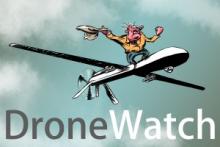
Rep. Keith Ellison (D-Minn.) writes in a Washington Post op-ed of the many unanswered questions about drone strikes. He points out that:
“The heart of the problem is that our technological capability has far surpassed our policy. As things stand, the executive branch exercises unilateral authority over drone strikes against terrorists abroad.”
And as a way of changing that unilateral authority, he proposes three major points that should be considered by Congress to create a “legal framework to guide executive action.”
“First, we must do more to avoid innocent civilian casualties.
“Second, Congress must require an independent judicial review of any executive-branch 'kill list.'
“Third, the United States must collaborate with the international community to develop a widely accepted set of legal standards.”

For a number of months, I’ve reported and commented on news of drone strikes, the drone program, and legal and political challenges to it. But with the administration’s refusal to officially acknowledge the program, there’s a a lot we don’t know. Cora Currier at Pro Publica has an informative summary of what we know and what we don’t know about drone strikes.